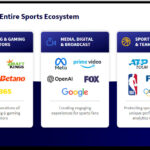Sportradar increases guidance, share repurchases
Reflective of a third quarter in which all major metrics were higher, Sportradar began its earnings call Wednesday with the announcement that it was authorizing an additional US$100 million in share repurchases. SRAD shares were trading at US$25.58 at the time.
Two days ago (3 November), Sportradar had closed its acquisition of IMG Arena, a data purveyor to sports fans.
“IMG Arena fits squarely in (Sportradar’s) greater strategy … enhances our already robust global portfolio,” enthused Chief Executive Carsten Koerl, bringing “more must-have betting content.” Some synergies from the IMG Arena deal would be immediate, Koerl said, while others would take time to manifest.
Other benchmarks observed by Koerl during the earnings call included the conclusion of Sportradar’s first season of partnership with Major League Baseball, which saw revenues exceed management’s expectations. Also, a partnership with the Spanish League Cup was extended through 2032, including international media rights.
Koerl also touted Sportradar’s continuing alliance with the National Basketball Association, which included new, court side-streaming products. The Chief Executive also highlighted a new, basketball-centric, AI application, which models myriad points of player data in real time.
Progress in marketing services was highlighted.
“We saw robust performance across multiple channels,” Koerl said. “We are seeing a clear trend in today’s fractured media environment, with clients increasingly turning to Sportradar.”
This included extending data-provision pacts with Google and Yahoo.
Koerl said he’d been following prediction markets for 25 years “but their share has been limited.” However, he thought Sportradar could provide them with complementary and incremental gains in the sports-betting sphere.
The major sporting leagues, Koerl continued, were differentiated in their attitude toward event contracts, but are also looking for financial participation. The states, for their part, were said to be oriented more toward player protection and tax collection. And online-sports-betting providers were described as seeking a level playing field, particularly in those states where online sports betting is not legal.
Prediction-market share was, in Koerl’s assessment, “a relatively small amount, limited to less games.” The markets were, he said, well-positioned and liquid for covering a select number of big-ticket games and special events, such as the Super Bowl, not large amounts of games such as the baseball season.
“It needs clear regulation,” he added, as well as player protection, anti-money-laundering safeguards and overall clarity.
Chief Financial Officer Craig Felenstein acknowledged some Sportradar headwinds, tied to fluctuations in the United States dollar. Still, he said that Sportradar’s marketing and media services had led its growth, while sports-integrity business “more than doubled.”
Felenstein lifted Sportradar’s full-year guidance for 2025 to €1.3 billion (US$1.5 billion)1 EUR = 1.1496 USD
2025-11-05Powered by CMG CurrenShift, including a 30% cash-flow increase to €290 million (US$333 million)1 EUR = 1.1496 USD
2025-11-05Powered by CMG CurrenShift. He predicted a 2026 revenue boost of as much as 25%, thanks to the IMG acquisition.
Koerl added that IMG Arena was in “an interesting space from a product perspective. We have already a powerful product portfolio and we can ingest this data. We see very exciting and interesting opportunities.”
Perhaps inevitably, the NBA scandal was raised for discussion.
“We are very proud of our integrity service,” Koerl replied. “Integrity is in the highest interest of all our stakeholders. We are getting more and more precise in spotting [wagering] inconsistencies.
“Sport is a perfect instrument for introducing customers to igaming,” said Koerl, switching topics. “Once we are feeling strong enough, we are looking into very scalable markets,” including the US. “It’s a natural environment for us.”
David McKee is an award-winning journalist who has three decades of experience covering the gaming industry.
Verticals:
Sectors:
Topics:
Dig Deeper
The Backstory
Why investor confidence hardened before the latest guidance bump
Sportradar’s push to lift guidance and authorize more buybacks did not happen in a vacuum. The company had just closed its Nov. 3 acquisition of IMG Arena, adding a large feed of rights and fan-facing data that it says will deepen its portfolio across media, marketing and betting. Management framed the deal as both immediately accretive in select areas and a longer runway for synergies. The industry context supports that stance: operators and suppliers are competing on speed, reliability and differentiated content in live moments, which raises the premium on owned data, streaming rights and tools that convert engagement into handle.
Parallel moves across the sector point to the same thesis. Live content and table-centric experiences are gaining weight alongside slots, and strong demand for high-availability streaming is shaping road maps for both operators and suppliers. Evolution’s latest update underscored that dynamic, with the company reporting higher revenue and calling out momentum across North America and Europe despite cyber-related constraints in Asia. That backdrop, detailed in Evolution’s fourth-quarter revenue report, reinforces why Sportradar is emphasizing courtside streaming products, NBA alignment and a basketball-focused AI engine that can price and personalize in real time.
The strategic through line: winning share now hinges on who can blend rights, data science and user experience into must-have live products. IMG Arena’s assets fit neatly into that race.
Deal flow meets a shifting U.S. policy map
The United States remains the growth engine for digital betting and gaming, but policy risk is not fading. Operators have stayed constructive about state-by-state expansions and the ability to manage “tax creep,” even as some jurisdictions eye higher rates or tighter deductions. BetMGM’s first-quarter commentary captured the stance: promotions are moderating, but profitability is improving; potential tax bumps look local rather than systemic; and new markets like Missouri and Alberta can offset heavier hits in legacy states.
DraftKings sent a similar signal. In a February discussion with Jefferies, the company projected confidence that any New Jersey increase would likely be negotiated and manageable for scaled operators. The firm, according to Jefferies’ readout of DraftKings’ remarks, expects new-state openings and product improvements to blunt higher rates elsewhere. That posture matters for Sportradar because operator health directly drives demand for its data, integrity and marketing services.
At the federal level, a late-emerging wrinkle rattled high-value players and, by extension, VIP economics. A budget package provision would limit gamblers to deducting only 90% of losses against winnings for tax purposes, a shift that could reshape behavior at the margins. Industry voices and Nevada lawmakers warned it could dent profitability for frequent players and spill into operator economics. The proposal and reaction are captured in reporting on gamblers’ concerns over the budget bill’s tax language. While the measure has not yet remapped state-level economics, the debate underscores a broader theme: pricing power for operators and suppliers will have to outrun periodic policy frictions.
The product arms race favors deep data and low-latency streams
Operators are steering customers toward higher-engagement markets and content, which elevates the value of granular data and rapid pricing. DraftKings has leaned into proposition bets and minimized downtime, positioning live video alongside wagering to raise session length and turnover, according to Jefferies’ notes on DraftKings’ strategy. The pivot aligns with Sportradar’s investments in on-court cameras, computer vision and AI models that can process player tracking and contextual events in milliseconds.
The supplier side also faces a localization mandate as U.S. tastes evolve. Themes, mechanics and jackpot structures with land-based DNA still resonate online, but the fastest-growing pockets are where live, social and real-time elements converge. As Games Global executives told COMPLETE iGAMING, suppliers with flexible stacks and U.S.-specific pipelines are best positioned to gain share. IMG Arena’s ingestion into Sportradar’s platform widens the company’s toolkit to deliver that local fit across leagues and bet types while giving operators more ways to package content inside their apps.
The implication for investors: the more Sportradar can prove it controls critical inputs—official data, streaming angles, micro-bet pricing—the more durable its pricing and renewal dynamics become, even as operators squeeze promotional costs and seek vendor efficiencies.
Integrity, prediction markets and the regulatory line
Integrity services are increasingly a differentiator, not just a compliance box. Sportradar says its monitoring business has more than doubled, and recent headline cases put a spotlight on the ability to detect anomalies quickly. That helps leagues, regulators and books align on enforcement while keeping product breadth intact.
A newer competitive wrinkle is the emergence of prediction platforms that test the edges of federal and state rules. BetMGM flagged “a degree of risk” from these markets, particularly where legal sports betting already exists, while signaling it could participate if the framework settles. Those comments came on the same call in which management discussed tax and regulatory drift, as detailed in BetMGM’s first-quarter recap. Sportradar, for its part, has argued prediction markets remain niche and require clearer regulation and safeguards to scale. Both views point to the same conclusion: clarity will determine whether these platforms become complements, competitors or footnotes.
Until then, the path of least resistance is deeper partnerships with major leagues, more official data nodes and faster resolution of integrity flags—areas where Sportradar is spending and where IMG Arena’s assets can compound the moat.
Cash discipline and credibility for a higher bar
Sportradar paired its outlook raise with an additional $100 million in buybacks, a signal that management sees the stock as undervalued against expected cash generation. The credibility test is execution. CFO Craig Felenstein cited currency headwinds but pointed to marketing and media services as growth leaders and projected stronger cash flow in 2025, with the IMG deal boosting 2026 revenue.
Peers have created room for that optimism. BetMGM reported a profitable quarter and said 2025 is when it “turns the corner,” as detailed in its update to analysts. Evolution’s revenue climb, outlined in its fourth-quarter results, shows demand for premium live content remains resilient. And DraftKings’ push into props and integrated streaming, summarized in Jefferies’ notes, supports a richer mix that benefits data suppliers.
The stakes are clear. If Sportradar converts IMG Arena synergies, sustains integrity leadership and monetizes faster, more personalized markets without tripping on regulatory or currency shoals, its raised guidance can stick. If not, a competitive field that is getting sharper on product and price will narrow the gap.
What to watch next
Four markers will test the thesis in coming quarters: how quickly IMG Arena revenue plugs into live products and media deals; whether integrity wins continue to drive contract renewals with leagues and operators; the pace of operator mix shift into props and micro-markets that monetize Sportradar’s AI; and how state and federal tax debates resolve, including the proposed loss-deduction cap highlighted in industry reactions to the budget bill. Positive reads on those items would validate the company’s decision to lift guidance and step up share repurchases now.






